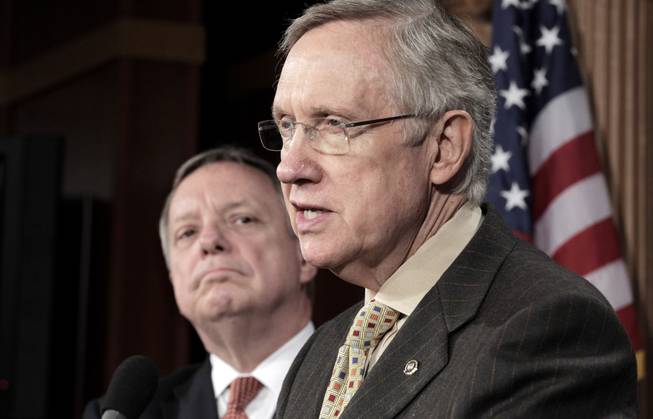
AP Photo/J. Scott Applewhite
Insisting there is too much to do for lawmakers to spend a week away from the Capitol, Senate Majority Leader Harry Reid, right, accompanied by Senate Majority Whip Richard Durbin of Ill., speaks to reporters on Capitol Hill in Washington, Thursday, June 30, 2011, after announcing on the floor that he intends to bring senators back to work right after the July 4th holiday to tackle the looming debt-limit crisis.
Thursday, June 30, 2011 | 8:29 a.m.
Sun Coverage
WASHINGTON - You know things are serious when senators are willing to skip their most patriotic vacation.
Sen. Harry Reid announced this morning that he’d keep the Senate in session next week, giving lawmakers only the Fourth of July off in a week that they traditionally spend out of Washington, to continue working toward a deadline on a budget compromise that is now only a month away.
The move seems a direct response to comments President Barack Obama made in a press conference yesterday about Congress’ legislative habits:
“If by the end of this week we have not seen substantial progress, then I think members of Congress need to understand we are going to, you know, start having to cancel things and stay here until we get it done,” Obama said. “You need to be here. I’ve been here ... you stay here, let’s get it done.”
Obama seemed to be directing his comments mostly at the House, remarking: “you know, they’re in one week, they’re out one week, and then they’re saying Obama’s gotta step in.”
But the House, which is not in session this week, was already scheduled to be in session next week -- so it was the Senate that took the none-too-subtle cue.
“There is still so much to do to put Americans back to work, cut our deficit and get our economy back on track,” Reid said this morning in his opening comments on the Senate floor. “And that work is too important, the obstacles too steep and the time too short to waste even a moment.”
There are many items on Congress’ plate now, but none looms so large and so urgent as the need to strike a budget deal in advance of the debt ceiling deadline. In early August, absent a deal that allows the U.S. to raise its legally mandated debt limit, which now sits at $14.294 trillion, the country will start to default on its debts, likely causing a ricochet effect throughout all federal spending programs and the global markets.
Republicans have been pushing hard against the idea of raising the debt ceiling absent deep cuts to the federal budget, arguing that the country can’t shoulder more debt when it's already borrowing more than 40 cents of every dollar spent. Democrats agree that there should be cuts, but point out that raising the debt ceiling isn’t a blank check to incur new debts, so much as a means of paying off the bills we’ve already racked up.
The threat of default -- which would be a first for the U.S. -- has exacerbated tensions and accelerated the process of a budget deal for fiscal 2012, which begins on Oct. 1, about two months after the debt ceiling will be hit.
There have been all sorts of mitigating proposals thrown out. Some senators have suggested passing a short-term debt limit increase, to tide the country through the rest of the year. Others have said it might be worthwhile to seek a declaration of the debt ceiling as unconstitutional, vitiating the legal limit altogether.
But whatever interim measures smaller groups of lawmakers pursue, at the end of the day, a deal has to be made -- and that’s exactly where things are breaking down.
Last week, House Majority Leader Eric Cantor and Senate Republican Whip Jon Kyl bowed out of a budget negotiation group, led by Vice President Joe Biden, complaining that the group had reached an impasse over collecting revenues. It was the second group tasked with drafting a compromise to falter, the first being the so-called Gang of Six, led by Senate Budget Committee Chairman Kent Conrad of North Dakota, when Oklahoma Sen. Tom Coburn -- a debt commission member who had already endorsed one compromise proposal through that body -- withdrew himself from the group.
Democrats have argued that in order not to hamstring the economy in the name of cutting, the government is going to have to collect more taxes as well -- not from the working, middle class, they stress, but by cutting subsidies for luxury items and large conglomerates like the big oil companies, and by allowing the tax cut scheme initiated under President George W. Bush to expire for those claiming $250,000 in income.
Republicans have bristled at the idea of cherry-picking tax programs to demonize, though National Republican Senatorial Committee Chairman John Cornyn of Texas did say Wednesday that he thought individual tax schemes were up for discussion on a case-by-case basis.
Overall though, Republicans argue the recipe to mend the country’s revenue problem is that the tax code needs to be rewritten to encourage more private enterprise, which they say in turn will create more taxpayers.
But without a group in place to air these ideas and strike compromises, it’s not clear exactly what all these lawmakers are going to be doing in Washington over the next few weeks, other than delivering very impassioned political speeches on the congressional floors.
Conrad said Wednesday he plans to unveil the budget committee Democrats’ proposal during the extra work week, but when the Sun asked if he thought it could draw bipartisan support, he grinned with a short laugh in saying “it could.”
It looks like this round of the battle is shaping up to be like those that came before: those being the tax cut compromise of December 2010, and the fiscal 2011, government-shutdown-avoiding deal of April 2011, both of which were ultimately concluded between congressional leaders hunkered down in offices that became the eye of storming political tempests everywhere else in Congress.
The one difference may be that the president seems to be talking a lot tougher to the members of Congress; especially to those on the Republican side.
“If everybody else is willing to take on their sacred cows and do tough things ... then i think it will be hard for the Republicans to stand there and say that the tax break for corporate jets is sufficiently important that they won’t come to the table and get it done,” Obama said. “Everybody else has been willing to move off their maximum position, they need to do the same. My expectation is they’ll do the responsible thing.”



Join the Discussion:
Check this out for a full explanation of our conversion to the LiveFyre commenting system and instructions on how to sign up for an account.
Full comments policy